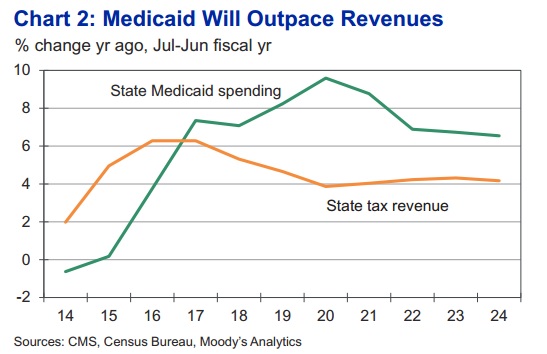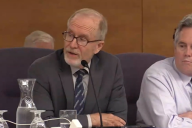You have /5 articles left.
Sign up for a free account or log in.
CHICAGO -- State tax revenues are up. But the next decade is looking rough, thanks largely to rising Medicaid costs. And public higher education will bear the brunt of tighter state budgets.
That's the central finding of a new study from the National Commission on Financing 21st Century Higher Education. The University of Virginia's Miller Center created the nonpartisan commission last year with funding from Lumina Foundation.
“Huge growth” in Medicaid spending is leading to a “tipping point” for public colleges, said Ray Scheppach, an economic fellow at the center. Scheppach presented the study's findings here this week at a meeting of the Education Writers Association.
State spending nationwide on Medicaid was 15.6 percent of overall state budgets in 2013. That spending will increase to 17.9 percent by 2024, estimated the report, which is based on projections from Moody's Analytics.
The increase in Medicaid costs will siphon away $60 billion more from state budgets over the next decade, according to the center, with the bulk of that diversion coming after 2020.
“That $60 billion would have been available to all discretionary spending, including education,” said Scheppach.
State Medicaid expenses will grow slowly during the next few years, the study found, after five years of rapid growth around the recession. But they will pick up again near the end of the decade, as federal funding for the Affordable Care Act expansions begins to decrease.
By 2020 increased state spending on Medicaid will outpace tax revenues. Higher education will be “crowded out,” according to the study, and allocations for public colleges will grow by less than 4 percent per year.
On average, state contributions to public higher education will decline from 12.9 percent of total spending in 2013 to 12.7 percent in 2020.
While that drop doesn't sound like much, Scheppach said it comes as policy makers, employers and researchers say the knowledge economy will require more college graduates, not fewer.
“Education is the major source of innovation and productivity change and also a major cost to middle- and low-income families,” Mike Castle, a former Republican governor and U.S. congressman from Delaware, who co-chairs the commission, said in a written statement. “We are seeing the potential for a significant negative impact on both long-run economic growth for the nation and access to higher education, particularly for low-income families and minorities.”
The report did not include pension liabilities as a mandatory spending item in its calculations. As a result, states with big unfunded pension obligations could see further slowing in higher education spending. Those states include Illinois, which faces as much as a $100 billion pension shortfall over the next 30 years.
Illinois's new Republican governor, Bruce Rauner, has proposed deep cuts to cope with the state's current $6 billion budget hole. Democrats have criticized his proposed slashing, which includes cuts to higher education, saying it will hurt the state's neediest citizens.
Rauner wasn't shy in defending his budget plan while speaking here on Monday.
“We're going to bring financial discipline to our system,” he told the group of journalists.
Higher education has failed to control costs, Rauner said. Administrative “overhead” and wasteful spending have been a “huge problem” at public four-year institutions, he said.
Administrative bloat also is an issue at the state's community colleges, he said, but less so than at four-year institutions.
Many two-year colleges in Illinois now get just 5 percent of their total revenue from the state -- among the lowest relative contribution in the nation -- with larger portions coming from tuition dollars and local governments.
Rauner, however, emphasized that budget slashing predates his time as governor, which began earlier this year. His plan, he said, would be to increase funding by growing the state's “way to prosperity.” And raising taxes is not the right solution, said Rauner.
“Illinois has been cutting education for years,” he said, adding that the state is at the bottom for per-capita spending. “That’s a travesty, and we’re going to change that.”








